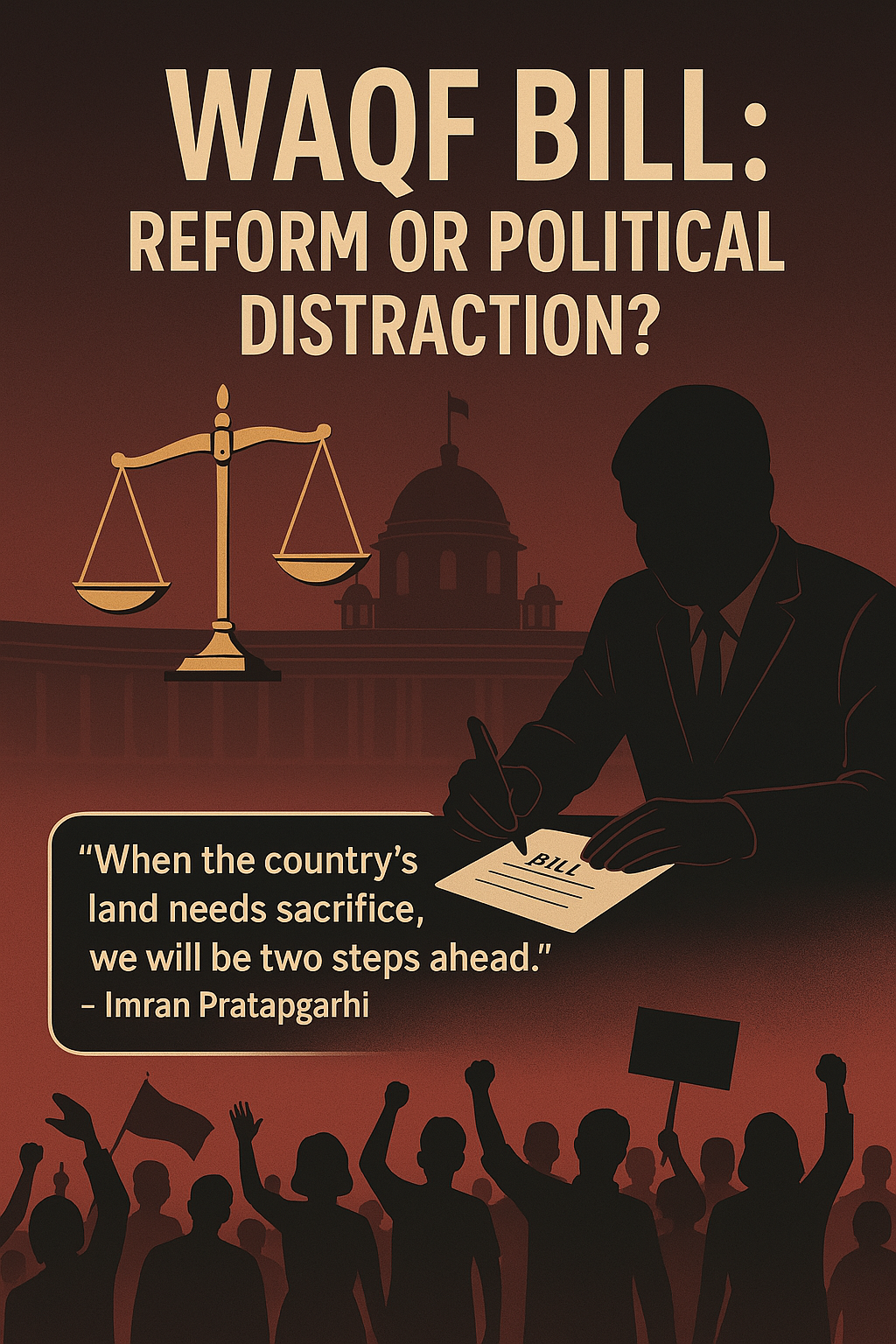Understanding the Controversies Surrounding the Waqf Bill

The Waqf Bill has become a hot topic of debate in Indian politics, especially following strong statements from political leaders like Imran Pratapgarhi. This legislation, which aims to regulate Waqf properties, is seen by many as politically motivated and potentially harmful to the Muslim community. In this blog, we will explore the key points surrounding the Waqf Bill, its implications, and the criticism it has received from various quarters.
What is the Waqf Bill?
The Waqf Bill is designed to regulate properties dedicated for religious or social welfare purposes under Islamic law. In India, these properties are managed by Waqf Boards. The current bill proposes new provisions regarding the acquisition, management, and dispute resolution of Waqf properties. However, its introduction has raised eyebrows, particularly regarding its timing and intent.
Political Context and Timing
Imran Pratapgarhi has highlighted the timing of the Waqf Bill’s introduction, which coincided with significant political events, including the announcement of 26% tariffs on India by the United States. He argues that the government is using the bill as a distraction from pressing economic issues. According to him, “The parliament was working until 2 in the morning, and at 1:30 am, the US imposed tariffs. The country must understand that this Waqf Bill was pre-planned to deviate people from the issue of tariffs.”
This assertion raises questions about the government’s priorities and whether the Waqf Bill is a genuine attempt to help the Muslim community or merely a political maneuver.
Criticism of the Waqf Bill
The opposition parties have been vocal in their criticism, claiming that the bill is unconstitutional and aimed at political appeasement. Critics argue that the bill increases government control over Waqf properties, undermining the rights of the Muslim community. Pratapgarhi and other leaders have expressed concerns that the bill will not benefit Muslim women, despite claims to the contrary.
“The bill is not a new hope for Muslims, but rather a method to control and undermine their rights,” Pratapgarhi stated during his address. He emphasized that the ruling party does not have any Muslim women in its ranks, questioning their ability to advocate for Muslim rights effectively.
Historical Context of Waqf Properties
To understand the current controversy, it’s essential to look back at the historical context of Waqf properties. These properties have been dedicated to religious and social purposes for centuries. The Waqf Act of 1995 was designed to protect these properties, but the new amendments proposed in the current bill have raised concerns about their future management.
Pratapgarhi referred to historical figures like Maulana Abul Kalam Azad, who emphasized the importance of preserving Muslim heritage. He argued that the current bill undermines this legacy by challenging the ownership and management of Waqf properties.
Constitutional Concerns
One of the primary arguments against the Waqf Bill is its perceived violation of constitutional rights. Articles 14, 29, and 30 of the Indian Constitution guarantee equality and the right to religious freedom. Critics argue that the bill contradicts these principles by allowing the government to exert undue influence over Waqf properties.
Pratapgarhi stated, “The government is crushing the Constitution every day, and this bill is just another example of that.” He called for public awareness about the implications of the bill and urged citizens to stand against it.
Public Reaction and Future Implications
The public reaction to the Waqf Bill has been mixed, with many expressing outrage over the government’s intentions. Protests have erupted in various parts of the country, with citizens demanding the withdrawal of the bill. The opposition has vowed to challenge the bill legally, asserting that it violates the rights of the Muslim community.
As the debate continues, the future of the Waqf Bill remains uncertain. Will the government reconsider its approach, or will it proceed with the bill as planned? The answer may depend on public pressure and ongoing political discourse.
Conclusion: A Call for Unity and Understanding
As the controversy surrounding the Waqf Bill unfolds, it is crucial for all communities to engage in open dialogue. Understanding the implications of such legislation is vital for fostering unity and ensuring that the rights of all citizens are upheld. As Pratapgarhi eloquently put it, “When the country’s land needs sacrifice, we will be two steps ahead.”
In conclusion, the Waqf Bill is not just a legislative issue; it is a matter of identity, rights, and the future of a community. As citizens, it is our responsibility to stay informed and advocate for justice and equality for all.




